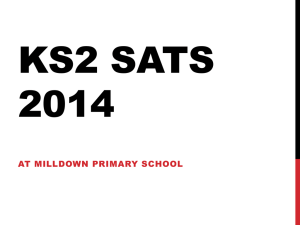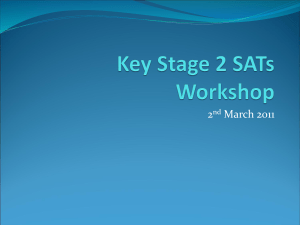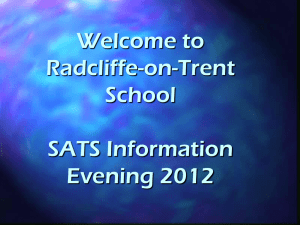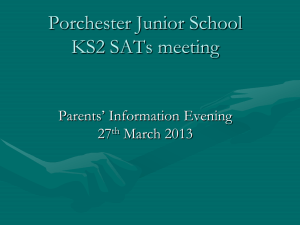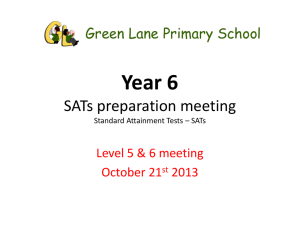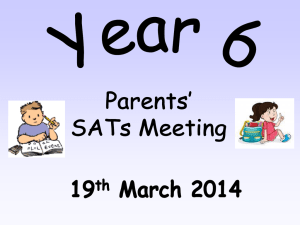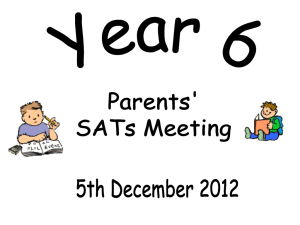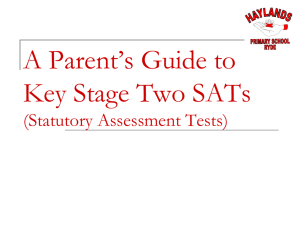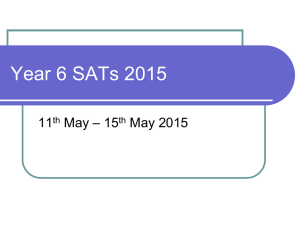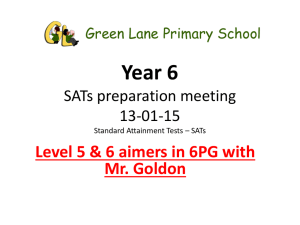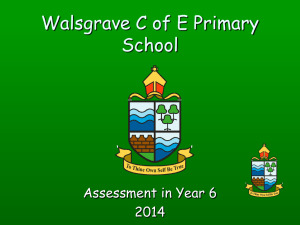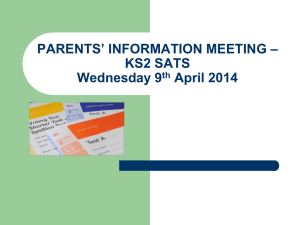SATs Powerpoint presentation for parents
advertisement
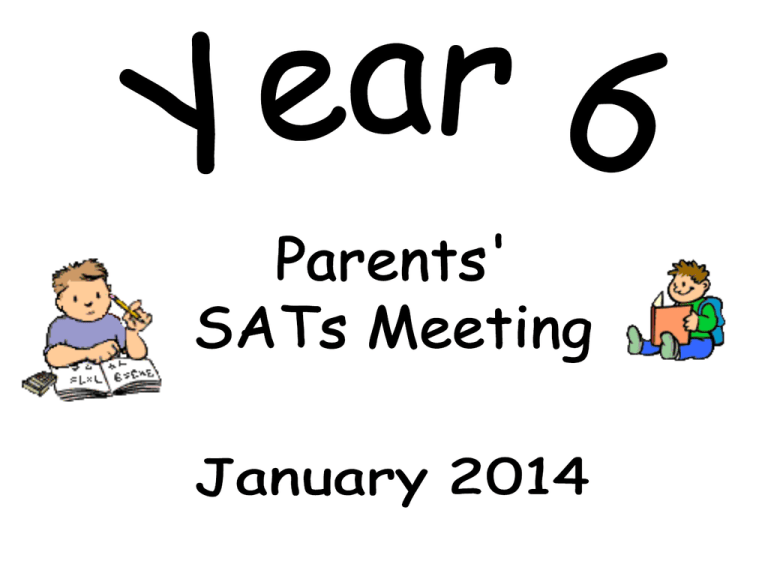
Aims of the session •To share important information about KS2 SATs •To answer any questions about KS2 SATs •Discuss / share ideas about how you as a parent can help your child at home What are KS2 SATs? •Standard Assessment Tests •All children have to be tested before they go to high school •Provide assessment information for high schools •Purpose – assign National Curriculum levels to children before they leave primary school •Level 2 – these children will not be entered for the tests •Level 3 – below age related expectation •Level 4 – age related expectation ( this is now a 4B ) •Level 5 – above age related expectation What other information do high schools want? • • • • SATs results Teacher assessments Tests administered by the high schools It varies according to which high school your child is going to What does teacher assessment involve, and is it different from testing? •Teacher assessment draws together everything the teacher or teachers know about a child, including observations, marked work and school assessments. •Teacher assessment is not a ‘snapshot’ like tests and is therefore more reliable. •There can be a difference between teacher assessment results and test levels. •Teacher assessment only, is used for children who work below level 3 (children who don’t do the SATs). How is SATs week organised? •A timetable is issued to school, telling us on which days/sessions tests must be administered. •All children must sit the tests at the same time. •Test papers can only be opened 1 hour before the tests begin. •Tests are completed in classrooms, with any displays that may help covered over. •Children are divided into groups for test administration to ensure they are properly supported and feel secure. Year 6 SATs Week 12th May – 16th May Monday 12th May English Reading Test Tuesday 13th May Wednesday 14th May Thursday 16th May Friday 17th May English – Grammar, punctuatio n and spelling test Mental Maths Test Maths Test B Maths Test A Level 6 Maths paper 1 English short writing test Science test paper 1 Science paper 2 Level 6 Maths paper 2 English long writing test Any questions? How can parents help? •The best help is interest taken in learning and progress. •Supporting homework. •Good communication between the school and home. •Getting a good sleep on a school night! English SATs consist of: •A reading test •A grammar, punctuation and spelling test •A writing test ( this is now teacher assessed and then moderated by the local Authority ) THE READING TEST – 50 MARKS 1 hour Usually three different text types; however, this is changing this year. 1 mark to 3 marks for a question Biggest weighting – retrieval and inference •There are 4 main types of questions on the reading paper: •Literal – answer is there in the text •Deductive – look for clues •Inferential – read between the lines •Authorial intent – e.g. why does an author use a particular word Sentence from: ‘A Day in the English Countryside’ As the afternoon light started to fade, the cow stopped eating grass, stood instead with its head over the gate and gazed expectantly down the lane. 1. How light was it? (Literal) 2. What three things did the cow do? (Literal) 3. What time of day was it? (Deductive) 4. Where was the cow? (Deductive) 5. What do you think the cow was expecting? (Inferential) 6. What strategies does the writer use to give the reader so much information in a single sentence? (Authorial intent) How can parents help with reading? • Ensure your child reads every night! • Encourage them to read fiction and non-fiction. • Try to listen to your child read and ask them questions about the text. • Help them with the different skills of reading especially ‘skim’ reading where they are looking for key words in the text. • Speed reading • Reading homework Any questions? How can parents help with writing? •Again, reading a variety of texts – the more children read, the more familiar they become with different text types •Reading homework – text analysis •Writing homework – is very rare - but getting your child to write as much as possible –even shopping lists help •Spelling – spelling lists / rules every week –make sure your child knows the high frequency words •Grammar and punctuation homework – work with your child on these Any questions? SPaG – Spelling, Punctuation and Grammar test GRAMMAR National Curriculum KS2 expectations: Pupils should know: • What the term ‘word class’ means and the jobs of different word classes – nouns, verbs, adjectives, adverbs, pronouns, prepositions, conjunctions, connectives, articles. PUPILS NEED TO UNDERSTAND THE TERMS: • QUESTION • STATEMENT • COMMAND PUPILS NEED TO KNOW ABOUT CONJUNCTIONS although because Choosing the correct one for the context of the sentence Pupils are expected to have a sound grasp of subject – verb agreement and tense agreement: PUNCTUATION!! Pupils need to know how to use: capital letters full stops question and exclamation marks commas in lists commas to mark phrases or clauses inverted commas apostrophes brackets, ellipses, colons SPELLING TEST = 20 MARKS SPaG TEST = 50 MARKS In the sample test, the distribution of questions was as follows: Grammar 29 marks Vocabulary 9 marks Punctuation 12 marks The Maths Tests There are 3 papers for all pupils: • Mental Test - Out of 20 • Test A (No calculators allowed) - Out of 40 • Test B (No Calculators allowed) - Out of 40 Some pupils will sit the Level 6 tests: • Paper A (No calculator allowed) – Out of 25 • Paper B ( Calculator allowed) – Out of 25 The Maths Mental Test • • • • • Wednesday 14th May 2014 A warm-up to the written tests Approx. 20 minutes 20 questions/marked out of 20 Covers all the strands with an emphasis on number Key stage 2 mathematics 2006 mental mathematics test Last name First name School Total Marks Practice question 10 Time: 5 seconds 11 80 1 2 p 12 ºC 13 cm 2 90 p 3 14 4 0.9 15 Time: 15 seconds 5 16 Time: 10 seconds 308 6 17 0.7 0.077 0.77 7.007 150 7 44 18 30 p 8 9 0.707 mm 15 19 20 £ £1.95 girls 45 To help your child in the mental test: • • • • • • • Times tables EVERY day Number bonds up to 100 Measure – how many g’s in a kg? Double and half Quick addition facts Division facts Names of shapes Test A – No calculator allowed • • • • 45 minutes Tests pupils at Levels 3 to 5. Up to 25 questions and worth 40 marks. Covers all the strands in mathematics with number being more heavily weighted. Test B – Calculator NOT allowed (this is a change from 2013) • • • • 45 minutes Tests pupils at Levels 3 to 5. Up to 25 questions and worth 40 marks. Covers all the strands in mathematics with Number being more heavily weighted. General Hints for Success • • • • • • Underline key words Ask for questions to be read to you Annotate diagrams Show all the steps to multi-step problems Ensure digits are legible – digit formation Never overwrite a wrong answer The Facts- what children need to know • • • • Number bonds Tables facts Division facts Fraction, decimal and percentage equivalents • Names and properties of shapes • Measures How You Can Help at Home • Regular tables practice • Regular four rules calculation practice – caution pleasechildren learn a variety of methods at school – let them use which one they find easiest! • Revision/Practice resources • CGP booklets • Websites • BBC Bitesize • Maths for Real • Ensure homework is handed in on time • Keep in touch via the planner • School calculation policy (website) • Encourage your child to ask for a question to be read to them if they do not understand. What do SATs questions look like and some helpful strategies •Some questions are worth one mark and therefore accuracy is important. •Other questions are worth two marks and even if the answer is wrong, a mark may be given for correct working. •Teachers may read questions in both written papers to pupils if asked. How can parents help with Maths? •Support with homework – not just helping with the Maths but reading the question can really help. •TIMES TABLES!!! •Help your child to check their work through – this will help them to spot mistakes that can sometimes be easily fixed. Any questions? Special Arrangements Any questions? What are we doing? •Amazing teaching of course! •Vibrant curriculum – cross-curricular teaching •Setting for Maths and English •Teaching assistant support •Booster sessions •Homework •Test preparation •Fun – hard work but no stress on the children! Any questions? http://www.woodlands-junior.kent.sch.uk/maths/sats/index.html http://www.bbc.co.uk/bitesize/ks2/
